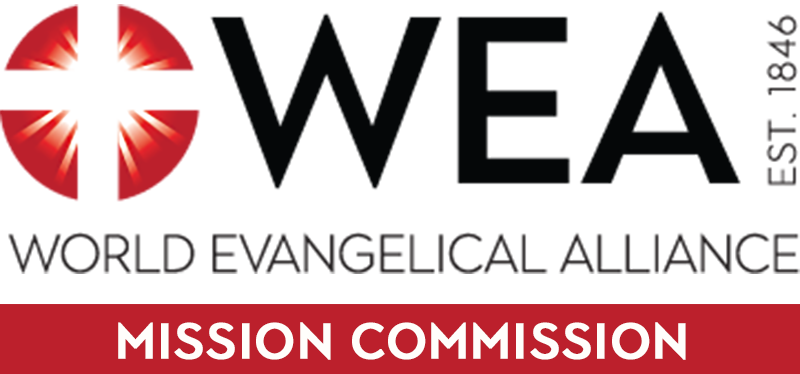
Select Page

In the interests of transparency, a PDF of our Constitution can be downloaded here.
The Mission Commission (MC) of the World Evangelical Alliance (WEA).
The MC envisions the proactive, synergistic, enabling of the global missions community to fully live, proclaim and extend to all peoples the transforming message of the kingdom of God in Christ Jesus through the power of the Spirit.
To strengthen participation in God’s mission.
The MC aims to inspire, advocate and strengthen participation in God’s mission by the global Christian community. In fulfilment of its commitment to develop strategic relationships, the MC serves, synergizes and adds value to global missions organisations and other groups and collaborative conversations towards greater effectiveness in missions practice. The MC also convenes gatherings and conducts research and various kinds of projects to provide the global Christian community with resources that will enhance missions practice for contemporary global contexts.
The MC values:
The MC accomplishes its vision and purpose through:
Participation in the MC is by invitation. Prospective MC Partner (MCPs) organisations and MC Associates (MCAs) apply to participate in the MC via an online form (currently here: https://weamc.global/apply/). Applications require the nomination and endorsement of an existing MC Associate and are subject to the approval of the Executive Committee of the MC’s Global Leadership Council in consultation with the Executive Director.
See below for additional benefits related to MCPs and MCAs.
In order to strategically and effectively serve WEA members and the global missions community, the MC invites participation from the following groups:
National and regional missions and church alliances, associations, movements or networks, which have their own member constituencies.
MC Partner organisations share the vision, faith and values of the MC and recognise the value of MC activities and outcomes for the strengthening of participation in the mission of God.
Approved participation as an MCP requires that the group:
In addition to the General Participant Benefits, benefits for participant organisations or groups include:
Groups applying to participate will be approved by the Executive Committee (ExCo) of the Global Leadership Council (GLC) in consultation with the Executive Director.
Should it be necessary, the Executive Committee of the MC will determine the termination of a participant’s subscription in consultation with the Executive Officer. The following points are primarily, but not exclusively, reasons that MC participant approval and related privileges may be withdrawn.
Participation in the MC is primarily by missions leaders (experienced or emerging). While some may attend as delegates of participating organisations, most are individually approved as MCAs.
MC Associates share the vision, faith and values of the MC and recognise the value of MC activities and outcomes for the strengthening of participation in the mission of God.
In addition to the General Participant Benefits, benefits for participant individuals include:
Individuals applying to participate will be approved by the Executive Committee (ExCo) of the Global Leadership Council (GLC) in consultation with the Executive Director.
Should it be necessary, the Executive Committee of the MC will determine the termination of a participant’s subscription in consultation with the Executive Officer. The following points are primarily, but not exclusively, reasons that MC participant approval and related privileges may be withdrawn.
The Global Leadership Council (GLC) functions as the governing board of the Mission Commission formed by leaders of key stakeholder organisations or as otherwise identified as valuable to the MC. The minimum size of the GLC should be 10, the maximum 18, with a decision-making quorum of 60% of the total number of the Council’s members. The GLC shall be constituted by MC Associates who are fully identified with the Mission Commission. The GLC will seek a balance of age, ministry and gender representation and will show an appropriate ratio of global representatives.
The GLC has a Chair and a Vice-Chair and ordinarily meets at least three times per year and extra-ordinarily when needed.
The GLC appoints officers, establishes the policies and priorities of the MC, provides oversight for the Executive Director, and evaluates operational health. The Executive Director is accountable to the GLC for approved outcomes and as such is an ex officio member.
GLC members are expected to play a proactive role in the life of the MC.
The MC has a Lead Cohort (LC) of Deputy Leaders comprised of experienced missions leaders from different ecclesiastical, cultural and ministry backgrounds. The number and qualification of LC members is determined by the demands of the MC’s strategic plan, but the LC should be no fewer than 3 and no more than 12 members in addition to the ED.
Deputy Leaders are identified, invited and appointed by the Executive Director as part of his/her wider operational leadership, in consultation with ExCo and ratification by the GLC.
Projects are functional activities authorised and conducted by the MC as part of its purpose to strengthen participation in God’s mission. Projects are outcome-defined activities led by an appointed MC leader to add value or otherwise contribute to a specific missions issue.
2. The ED will authorise MC projects, in consultation with the LC and ExCo.
3. The MC does not guarantee resources for any proposed project.
4. The ED and LC will assist project leaders (usually Synergists) to source funds and mobilize resources for the project.
The Mission Commission is a low-budget, high-impact global missions body that depends on various sources for its financial existence.
Income for the MC is generated from:
In addition to raising financial income to help achieve MC goals, significant value is added from the “contributed services” of volunteers.
The MC uses its financial resources for:
By default, involvement in MC leadership and projects is voluntary, usually by secondment from an organisation that is a subscribed participant. As with other volunteers, leadership involvement is considered a highly valued contributed service to the MC.
Last revised by the MC Global Leadership Council: June, 2022.